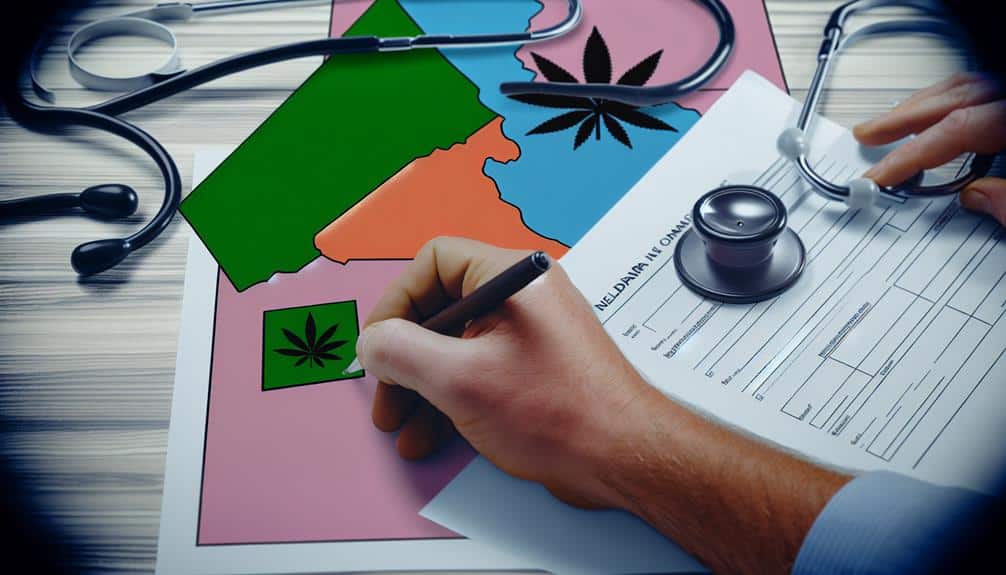Imagine you’re a Delaware resident battling a chronic illness, and traditional treatments haven’t been effective. Now, under Delaware’s new medical marijuana law, you’re given a fresh ray of hope. You’re eligible for a medical marijuana card, but what does that entail? How will it impact your life, and what legal implications could you face? It is crucial to navigate this new terrain with the right knowledge, ensuring your journey to wellness is smooth and compliant with the law.
Understanding the Purpose of the Law

In light of Delaware’s New Medical Marijuana Law, it’s crucial to grasp its underlying purpose. The primary motivation behind this law revolves around enhancing patient benefits. This means that as a potential patient or caregiver, you can look forward to improved quality of life and symptom management if you qualify.
This law isn’t about promoting recreational use; rather, it’s a compassionate response to the needs of those suffering from certain debilitating conditions. It acknowledges that conventional treatments aren’t always sufficient and sometimes alternative solutions are necessary. It recognizes the therapeutic potential of medical marijuana and integrates it into Delaware’s healthcare framework.
The law seeks to facilitate safe and legal access to medical marijuana while eliminating the need for patients to turn to illegal sources. It guarantees that patients can access their medication without fear of legal repercussions while also establishing stringent regulations to prevent misuse.
Additionally, this law aims at fostering a well-regulated industry capable of providing consistent high-quality medical marijuana products which meet certain standards thereby safeguarding your health.
Consequently, understanding this law isn’t just about knowing your rights but also about appreciating the efforts to protect and serve you better.
Eligibility for Medical Marijuana

Navigating the eligibility criteria for medical marijuana in Delaware requires a keen understanding of the law. It all starts with patient qualifications. You need to be a resident of Delaware and have a qualifying condition recognized by the state.
These qualifying conditions span a broad array, including cancer, Alzheimer’s disease, post-traumatic stress disorder (PTSD), and severe debilitating pain that hasn’t responded to other treatments for more than three months.
You’ll also qualify if you have a debilitating disease or medical condition that produces wasting syndrome, severe nausea, seizures, or severe and persistent muscle spasms.
Beyond these conditions, the law stipulates that you must be under the care of a physician registered with the Delaware Department of Health and Social Services. This physician must provide written certification stating that you have a qualifying condition and that medical marijuana may alleviate your health issues.
The Application Process Explained

To navigate the application process for medical marijuana in Delaware, you’ll first need to secure an appointment with your registered physician. During this consultation, your medical condition will be evaluated to confirm if it aligns with the state’s qualifying conditions. If you meet the criteria, your physician will provide a certification, an essential part of the application requirements.
Once you have this certification, the next step is completing the written application. This form asks for basic information but also requires you to outline your medical history and provide details of your qualifying condition.
Don’t forget to include your certification and a recent photo.
After submitting your application, there’s a processing timeline. State law dictates that your application must be processed within 30 days. However, don’t be discouraged if it takes the full time as the state is diligent in its review to guarantee all guidelines are met.
If approved, you’ll receive your medical marijuana card in the mail. Remember, this card doesn’t allow unrestricted access to marijuana but permits its use under conditions outlined by the state.
This thorough process ensures that medical marijuana is accessible only to those who truly need it.
Purchasing Medical Marijuana

Having received your medical marijuana card, you’re now legally permitted to make purchases at authorized dispensaries. But before you rush off, there are a few important things to understand about purchasing options.
Firstly, not all dispensaries are created equal. It’s vital to find a reputable one with knowledgeable staff who can provide accurate dosage recommendations because getting the right dosage can ensure effective treatment and avoid potential side effects.
Next, consider different purchasing options available at dispensaries which may offer a variety of products, including oils, tinctures, edibles, and traditional smokable forms. Each product may have different effects and use methods, so understanding these differences is crucial to making an informed choice.
Lastly, remember that while you’re legally allowed to buy medical marijuana, you’re only permitted to possess a certain amount at any one time. This limit varies depending on your specific medical condition and the recommendations of your healthcare provider.
Navigating the world of medical marijuana can be complex but with the right information, you can make choices that best serve your health needs. We’re here to help guide you through it.
Legal Implications for Patients

As a patient, it’s your responsibility to understand the legal implications that come with your new medical marijuana card. This card doesn’t just grant you access to treatment but also provides certain patient rights and legal protections.
Delaware’s new medical marijuana law has specific legal ramifications which include:
- You’re legally protected from discrimination in employment, housing, and public accommodations based on your status as a medical marijuana patient.
- Your medical records related to your marijuana treatment are confidential under the Health Insurance Portability and Accountability Act (HIPAA).
- You have the right to possess an amount of marijuana prescribed by your physician without fear of prosecution.
- You may not consume marijuana in public places or while operating a vehicle regardless of your patient status.
The Future Outlook on the Law

While understanding the current legal implications of Delaware’s new medical marijuana law is essential, it’s equally important to stay informed about future changes.
As the law continues to evolve, we anticipate a deepening dialogue between law enforcement and the medical community. The goal is to strike a balance that respects patient rights while also addressing public safety concerns.
The regulations of the law may become more specified, and there will likely be increased oversight to ensure strict compliance. Law enforcement officers will receive more training on the nuances of this law to avoid unnecessary confrontations or legal misunderstandings.
This will foster more respectful and knowledgeable interactions between patients and law enforcement.
The future may also bring changes in the types of conditions that qualify for medical marijuana treatment. As research progresses, the list of qualifying conditions could expand to include other chronic or debilitating conditions.
Conclusion
Understanding Delaware’s new medical marijuana law can seem like navigating through a maze but it’s essential for patients’ health and safety. You’re now armed with knowledge about eligibility, application processes, purchasing guidelines as well as your rights and responsibilities. Stay informed as future changes to this law may occur. Ultimately, this law provides you with a legal path to potentially life-improving treatment.
If you have any questions or need more information, we invite you to visit Cannabis Docs of Delaware. You can explore our website or give us a call at (855) 420-6797. We’re here to help guide you through the process ensuring you have everything needed for making informed decisions. Let’s navigate this journey together!
source https://delawarecannabisdocs.com/delawares-new-medical-marijuana-law-what-patients-need-to-know/

No comments:
Post a Comment